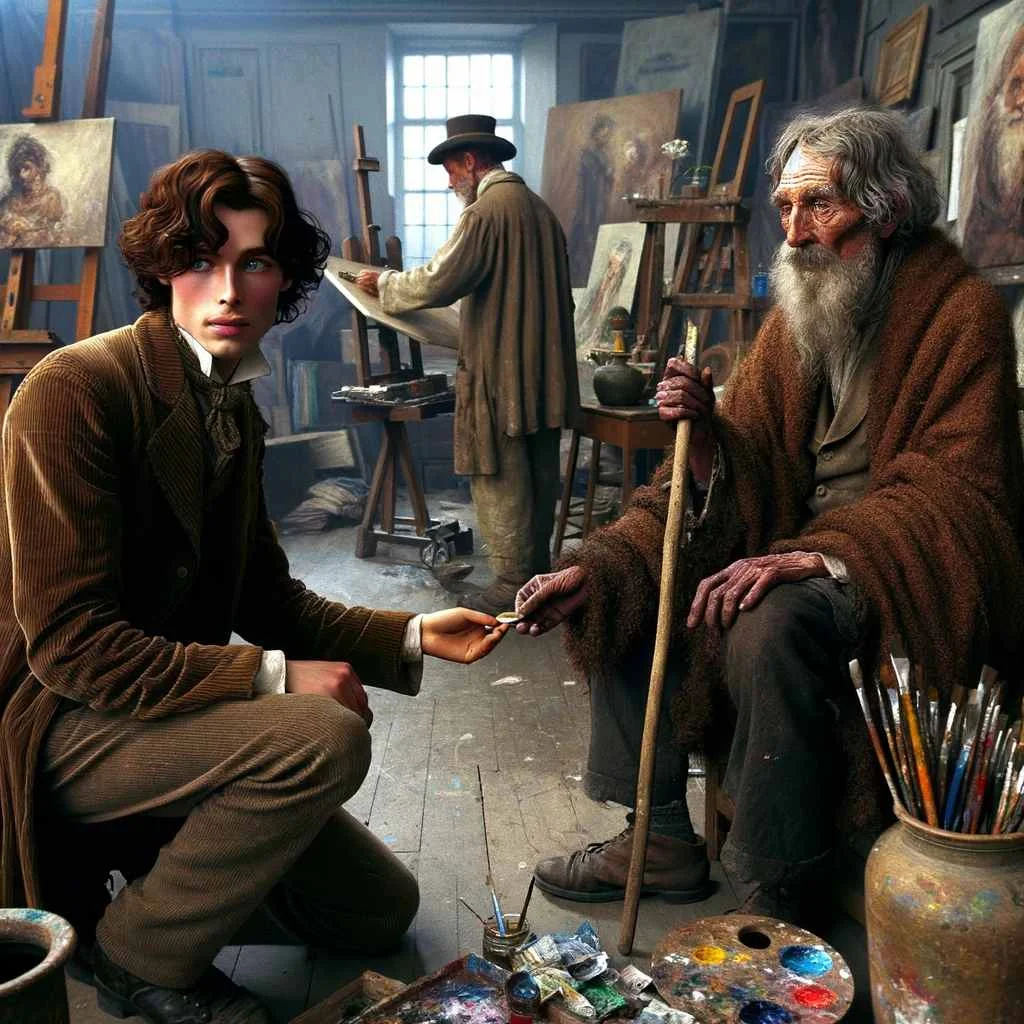A modern twist on Wilde’s short story: Hughie’s charm can’t buy love or success, but an act of kindness turns his fortunes in unexpected ways.
In today’s world, being wealthy is often seen as the only ticket to a life of charm and romance. The notion that love and adventure are reserved for the rich, leaving the less affluent to focus on practical and mundane matters, is a harsh reality.
This was a truth that Hughie Erskine, unfortunately, hadn’t grasped. Poor Hughie! In terms of intellect, he wasn’t exactly a standout. He wasn’t known for making particularly witty or cutting remarks.
But he was undeniably handsome, with his wavy brown hair, sharp features, and piercing grey eyes. He was as much a hit with his male peers as he was with women, and he was skilled in many areas—except, crucially, in making money.
Hughie’s inheritance from his father was a cavalry sword and an extensive 15-volume history of the Peninsular War.
He displayed the sword above his mirror, squeezed the history books between a guide to horse racing and a sports magazine on his shelf, and lived off a modest allowance of ten thousand a year from a generous aunt.
He’d tried his hand at various careers: he dabbled in the stock market but quickly found he was out of place among the aggressive traders.
He ventured into the online business world, but quickly found himself bored with the subtleties and intricacies involved.
Then there was a stint in selling dry sherry, but that venture dried up just like the sherry itself.
Eventually, he settled into a role that suited him best: a charming, ineffective young man with a stunning profile and no clear career path.
Hughie’s love life only added to his troubles. He was smitten with Laura Merton, the daughter of a retired Colonel who had left both his temper and his digestive health behind in India and hadn’t managed to recover either.
Also Read: The Library of Dreams
Laura was head over heels for him, and Hughie would’ve done anything for her. They were London’s most attractive couple, yet not a single penny to their names. The Colonel was quite fond of Hughie but firmly against their engagement.
“Come back when you’ve earned ten thousand pounds on your own, then we’ll talk,” he’d say. Those words left Hughie downcast, often seeking comfort in Laura’s company.
One day, on his way to the Mertons’ in Holland Park, Hughie decided to visit his good friend Alan Trevor. Trevor was a painter, which isn’t uncommon these days. But more than that, he was a true artist, and those are a rare breed.
Personally, Trevor was a bit of an oddball, with his freckled face and unruly red beard. But give him a paintbrush, and he transformed into a master, his works highly coveted.
Initially, Trevor was drawn to Hughie purely for his charm.
“A painter should only know people who are both foolish and beautiful,” Trevor often said,
“those who are a joy to look at and offer a mental break when spoken to. The world should be run by stylish men and delightful women.”
However, as Trevor got to know Hughie better, he grew to appreciate his lively spirit and his carefree generosity, eventually granting him unrestricted access to his studio.
When Hughie entered the studio, he saw Trevor adding final touches to a striking life-size painting of a beggar. The model, an actual beggar, stood on a platform in a corner, his aged face deeply lined like ancient parchment, wearing an expression of profound sorrow.
Draped over his shoulders was a tattered, coarse brown cloak; his heavy boots were a patchwork of repairs. He leaned on a rough stick with one hand and extended his worn hat for alms with the other.
“What an incredible model!” Hughie murmured, greeting his friend.
“Incredible? Absolutely!” Trevor bellowed. “You don’t find beggars like him every day. He’s a treasure, my friend; a living Velasquez! Imagine what Rembrandt would have done with him!”
Also Read: The Kidnaping of Red Chief
“Poor guy,” Hughie commented, “he looks so down. But I guess for you artists, his face is quite a fortune, right?”
“Of course,” Trevor agreed. “You wouldn’t want a beggar model who looks happy, would you?”
“How much does a model get paid for sitting?” Hughie asked, settling onto a divan.
“A 15 pounds an hour.”
“And what do you get for this painting, Alan?”
“For this one, ten thousand.”
“Pounds?”
“yes”
Hughie laughed. “I think the model should get a cut. They work as hard as you do.”
“Nonsense! Consider the effort of applying the paint, standing at the easel all day! It’s easy for you to say, Hughie, but there are times when Art nearly becomes as demanding as manual labor. But don’t distract me; I’m busy. Have a cigarette and be quiet for a bit.”
After a while, Trevor’s cell phone rang. “Sorry I have to take this one, it’s the Framemaker “
“Don’t leave, Hughie,” Trevor said as he left the room. “I’ll be back shortly.”
Seizing the opportunity during Trevor’s absence, the old beggar-man took a moment to rest on a wooden bench behind him. His forlorn and destitute appearance stirred Hughie’s compassion.
He rummaged through his pockets, finding only 10 pounds.
“He needs this more than I do,” Hughie thought, “though it means no taxis for a couple of weeks.” He approached the beggar and discreetly handed him the money.
The old man’s eyes briefly lit up, and a faint smile crossed his weathered face. “Thank you, sir,” he murmured gratefully.
When Trevor returned, Hughie, feeling a bit embarrassed about his impulsive generosity, quickly took his leave. He spent the day with Laura, received a playful scolding for his extravagance, and ended up walking home.
Later that night, Hughie dropped by the Palette Club around eleven and found Trevor alone in the smoking room, sipping hock and seltzer.
“Did you finish the painting alright?” Hughie asked while lighting a cigarette.
“Done and framed,” Trevor replied. “And guess what? You’ve charmed the old model. I had to tell him everything about you – your identity, address, income, prospects…”
Hughie, half-joking, half-concerned, exclaimed, “He’ll probably be waiting at my doorstep now! But you’re kidding, right? I wish I could help him more. His clothes were practically falling apart.”
Trevor chuckled. “But he looked fantastic in them. Your ‘rags’ are my ‘romance.’ What you see as poverty, I see as picturesque. Still, I’ll pass on your offer.”
Hughie, more seriously, said, “You artists can be so heartless.”
“An artist’s heart is his head,” Trevor responded. “We’re here to capture the world as we see it, not to reform it. And how’s Laura? The old model was quite curious about her.”
“You talked to him about Laura?” Hughie was astonished.
“Of course. He knows all about the strict colonel, the charming Laura, and the £10,000.”
Hughie was indignant. “You told that old beggar my private affairs?”
Trevor grinned. “That ‘old beggar’ is one of Europe’s wealthiest men. Baron Hausberg. He could buy London tomorrow. He owns houses in every capital, dines on gold plates, and has the power to prevent wars.”
Hughie was stunned. “What are you talking about?”
“Baron Hausberg posed as a beggar for my painting. A millionaire’s whim. And he looked superb in my old Spanish suit.”
Hughie’s jaw dropped. “I gave 10 pounds to Baron Hausberg!” He slumped into a chair, aghast.
Trevor roared with laughter. “You won’t see that again. He thrives on others’ money.”
Hughie grumbled about being informed too late and felt foolish.
Trevor explained his reasons, highlighting the uniqueness of the situation and Hausberg’s enjoyment of Hughie’s gesture.
Hughie resigned to his bad luck and decided to call it a night, begging Trevor to keep the incident secret.
Trevor encouraged him, praising his generosity and inviting him to stay and chat more about Laura.
Despite Trevor’s attempts to lighten the mood, Hughie left, his spirits low, while Trevor remained behind, still laughing.
The next morning, as Hughie was having breakfast, his servant handed him a card with “Monsieur Gustave Naudin, on behalf of M. le Baron Hausberg” written on it.
“He must be here for an apology,” Hughie thought, instructing the servant to show the visitor in. An elderly gentleman with gold-rimmed glasses and gray hair entered and asked in a French accent if he was speaking to Monsieur Erskine. Hughie nodded.
“I come on behalf of Baron Hausberg,” the man began.
Hughie hurriedly interjected, offering his sincerest apologies.
The gentleman smiled. “The Baron has asked me to give you this,” he said, handing over a sealed envelope. Written on it were the words, “A wedding present to Hugh Erskine and Laura Merton, from an old beggar.” Inside was a cheque for £10,000.
When Hughie and Laura got married, Alan Trevor was the best man, and Baron Hausberg gave a speech at the wedding breakfast.
“Millionaire models are rare,” Alan quipped, “but model millionaires are even rarer!”
Also Read: The Last Leave

